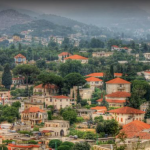It might not be much of an exaggeration to say that every Lebanese person is no more than two generations away from a village. The village is the beating heart of the Lebanese table, and even if you are a born and bred city kid like I am, the stone houses with their orange clay roofs and jasmine-scented gardens seem to exert a near irresistible pull on you whenever Sunday rolls around.
Our particular village lies in the region of Koura, along the Qadisha river valley. Koura is known in particular for its olives and its deep red soil. I would have to admit that it was in this village that I had my first culinary -- for lack of a better word -- awakening. As I said, we were city people. We bought refined white Arabic bread at the bakery, cheese at the supermarket, and ate our stews with polished white rice. We received our share of the family olive oil production in season and went up to the village for picnics on Sunday but never spent much time there otherwise, until one day Tripoli was no longer spared from the heavy bombing. The war had moved north.
After three hellish weeks in our building’s dank and flooded bomb shelter, we took advantage of a pause in the shelling to make our escape. My father stayed behind to protect the house from looters, and my mother drove my brother, grandmother, aunt and me through the eerily quiet city, up through the hills over the damaged skyline to our village, to stay at my grandmother’s house until things cooled down. This would be the first time I would experience the rhythms of daily life there.
The rhythms of daily life in the village begin at an ungodly hour of the morning, when your grandmother›s neighbor›s rooster enthusiastically greets the sunrise. Then the neighbor begins her own dawn ritual, shouting "Ya Abdul-Hamid!! Ya Abdul Hamid!! Waynak ya Abdul Hamid??” in a vain attempt to find her husband, who has probably already run off to drink coffee and play backgammon with his cronies. It is impossible for you to stay asleep at that point, so you walk out into the garden and the cold morning air to find your grandmotherhas set out a pot of sweet hot tea, fresh bread, cheese, labneh, the inevitable bowl of olives, tomatoes, zaatar, and honey. The honey: it comes from her mother, your great grandmother, who is 94 and lives just up the road. Sitti keeps bees in her backyard, in a row of clay amphoras. She can reach inside the jar and pick out the queen bee, just like that. She leaves a large chunk of honeycomb in the honey, and it is delicious with cheese. Your grandmother tries to
sit with you, but she can't help puttering around. There is just too much to do.
So you walk out, and meet up with a few other cousins, some local and some up from Tripoli like you are, and you wander around the village in a pack, occasionally pausing to sit on a low stone wall and discuss the topics of the day: school, clothes, gossip about other cousins not present. Every few steps
someone asks: whose kid are you? And you only need to give them your last name, they say, oh yes - are you I-s kid or S-s?
You buy little biscuits and sugary juice from the dekkeneh, a small shop housed in an old stone building that must›ve been around when your great grandmother was your age. You suspect some of the candy has been around as long. You are warned to stay away from the river path, because it is steep and lined with cactus and once a man fell over and died. You know it›s dangerous, you would never go by yourself. You also know that your dad was the one who drove the man to the hospital - you remember the dark brown stain in the back of the Volkswagen Rabbit.
So you walk around looking for stuff to do. At some point you are handed off to the great grandmother, who is making kibbe. She beats it in an ancient stone mortar, periodically removing the white strips of connective tissue so that all that is left is pure fine-pounded lamb. You realize why the texture of her kibbe is so much better than what you make in a Moulinex at home, the modern way. The straw mat in her bedroom is covered with ghostlike piles of cloth, in which she proofs her flat mountain bread. You are a little shocked when she places her bread straight on the low wooden table, using it like a plate to hold food, and the edges like a napkin to clean her hands. She rarely eats rice, preferring to eat her stews with cracked wheat, and you discover that you prefer it that way too. You understand that this food has a depth to it that means something, though you really can’t articulate what it is.
You meander back to your grandmother’s house, where she is sitting on the front porch, stirring a giant boiling cauldron of pomegranate molasses. She merrily shows you how her hands have turned black from the juice, and hands you a pomegranate to eat. She knows that you love them, and has saved the best one for you. She likes to tell you about when she was your age, and how she learned the Charleston, and also she tells a lot of jokes, not all of them entirely clean.
You have a light supper with your cousins: tea, toasted cheese sandwiches and cucumbers. You stay up all hours playing cards, and try not to think too much about your father alone in your apartment downtown.
By: Issam Masry






